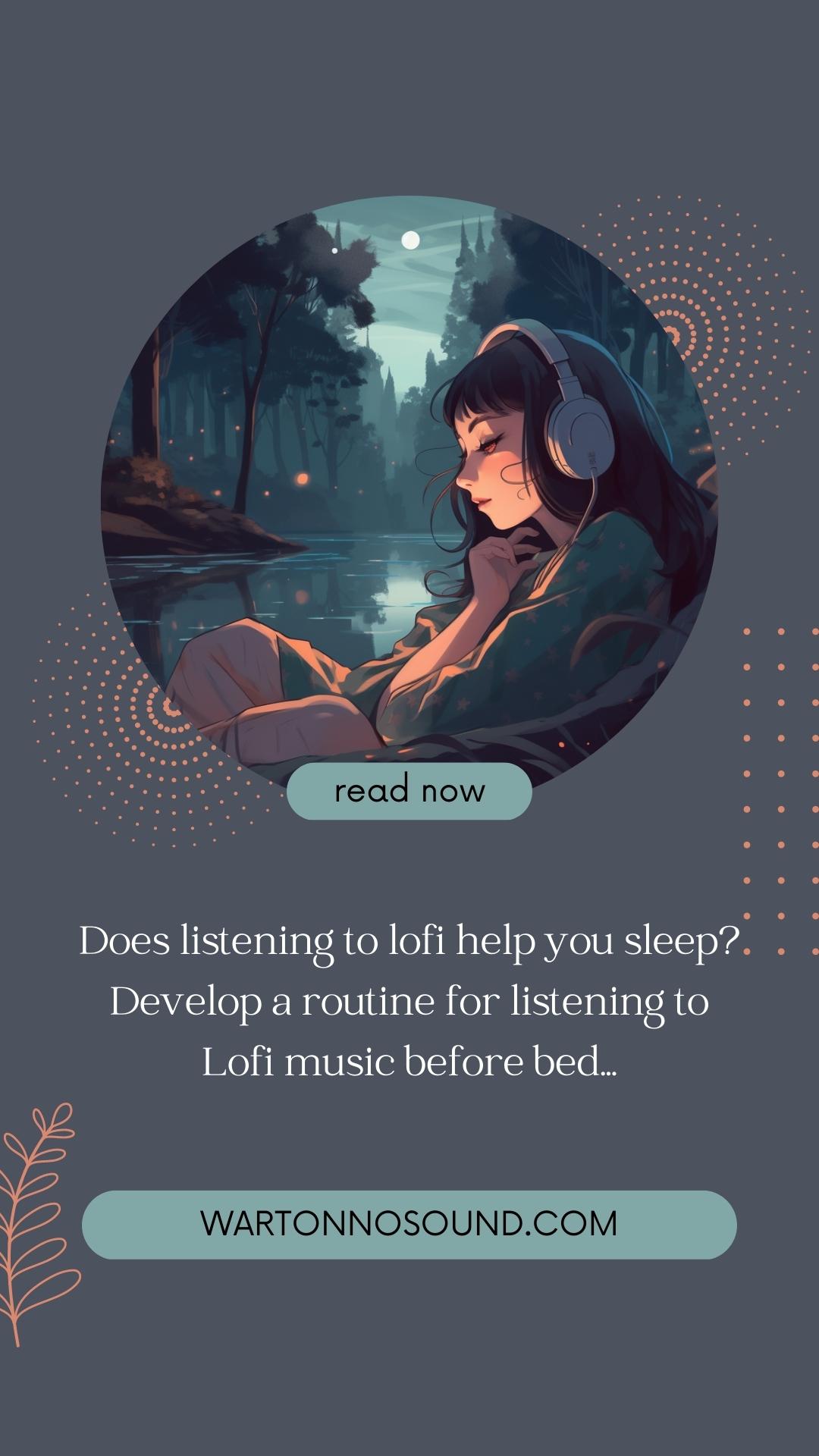You’re up late, staring at the ceiling, and trying to fall asleep. Your mind is racing, replaying every embarrassing moment of your life, and stressing about the meeting you have tomorrow. Suddenly, you remember hearing about this magical thing called Lofi music. You’ve heard that it can soothe the savage beast that is your anxious brain and lull you into a peaceful slumber. But you need to check if it’s real or just another internet fad. Does listening to Lofi help you sleep? Fear not, my weary friend, for I have the answers you seek. Here are the steps to take, and they’re not as complicated as the KonMari method of organizing your closet.
I. Research the Effect of Music on Sleep
Lo-fi calmbient music emerged as a natural evolution of the ambient music genre. Ambient music has its roots in the early 20th century, with the work of artists like Erik Satie and John Cage. It gained popularity in the 1970s and 1980s, with artists like Brian Eno and Tangerine Dream producing some of the most influential works in the genre.
A. Understand how music affects the body and mind during sleep
You might be wondering how listening to music can help you fall asleep. Well, it turns out that music has a powerful effect on the body and mind during sleep. According to research, music can slow down your heart rate and breathing, lower your blood pressure, and reduce muscle tension. All of these physiological changes make it easier to relax and fall asleep. Plus, music can help distract your mind from racing thoughts and worries, making it easier to let go and drift off into dreamland.
B. Identify the benefits of listening to music during sleep
The benefits of listening to music during sleep are numerous. For one, it can improve the quality of your sleep. A study on college students showed that those who listened to calming music before bed had significantly better sleep quality than those who didn’t. Additionally, listening to music can help reduce stress and anxiety, which are two major culprits of sleeplessness. Music can also enhance your mood and overall well-being, making it easier to face the challenges of the day ahead.
C. Evaluate scientific studies that examine the impact of music on sleep
Now, you might be thinking that all of this is just anecdotal evidence and that there’s no real scientific proof that music can help you sleep better. But fear not, my skeptical friend, there have been numerous scientific studies that support the notion that music can indeed improve sleep quality. For example, a study on older adults found that those who listened to soothing music before bed had significantly better sleep quality than those who didn’t. Another study showed that music can help reduce the symptoms of insomnia in people with chronic sleep disorders. So, the evidence is clear: music can indeed help you sleep better.
In conclusion, if you’re having trouble sleeping, it might be worth giving Lofi music a try. Understanding the effects of music on the body and mind during sleep, identifying the benefits of listening to music during sleep, and evaluating scientific studies that examine the impact of music on sleep are all important steps in determining whether Lofi music can help you sleep. So, put on those headphones, close your eyes, and let the soothing sounds of Lofi carry you off to dreamland.

II. Understand What Lofi Music Is
A. Define Lofi music and its characteristics
Lofi music, short for low-fidelity music, is a genre that originated in the 1980s. It’s known for its laid-back, relaxed vibe, and it is unique sound quality that’s often described as “gritty” or “imperfect.” Lofi music is typically created using a combination of analog and digital techniques, and it’s often associated with hip-hop and electronic music scenes.
B. Explore the different types of Lofi music
There are many different types of Lofi music, each with its own unique style and sound. Some of the most popular sub-genres include Chillhop, which blends Lofi with hip-hop beats, and Ambient Lofi, which features more ethereal and atmospheric sounds. There’s also Jazz Lofi, which incorporates jazz elements, and Vaporwave, which is a sub-genre of Lofi that’s known for its nostalgic and dreamy vibe.
C. Identify the potential benefits of listening to Lofi music
In addition to the benefits of music in general, Lofi music has some unique qualities that make it particularly well-suited for sleep. For one, its laid-back and mellow vibe can help create a calming and soothing atmosphere that’s perfect for relaxation. Additionally, its repetitive and predictable nature can help lull you into a state of relaxation, making it easier to fall asleep. And because Lofi music often lacks lyrics or vocals, it can be less distracting than other types of music, allowing you to focus on your breathing and let go of any racing thoughts.
In conclusion, now that you understand what Lofi music is and its unique characteristics, you can see why it’s such a popular choice for people who have trouble sleeping. Its relaxed and calming nature and predictable and repetitive sound make it the perfect soundtrack for drifting off into dreamland. So, the next time you find yourself staring at the ceiling, wondering if you’ll ever fall asleep, put on some Lofi music and let the magic happen.

III. Examine the Relationship between Lofi Music and Sleep
A. Identify how listening to Lofi music can affect sleep
Lofi music can have a significant impact on your sleep quality. One of the primary ways it can affect sleep is by reducing stress and anxiety levels. As we all know, stress and anxiety are major barriers to sleep. The calming and soothing nature of Lofi music can help to reduce the levels of stress and anxiety, making it easier to fall asleep and stay asleep.
B. Analyze the potential benefits of listening to Lofi music while sleeping
In addition to reducing stress and anxiety, Lofi music can have several other benefits when it comes to sleep. For one, it can help to regulate your breathing and heart rate, which is essential for falling into a deep, restful sleep. It can also block out any distracting noises in your environment, creating a peaceful and relaxing atmosphere for sleep. And finally, Lofi music can help to improve the overall quality of your sleep, leaving you feeling more rested and refreshed in the morning.
C. Evaluate scientific studies that examine the relationship between Lofi music and sleep
There have been several scientific studies that have looked at the relationship between Lofi music and sleep. One study published in the International Journal of Environmental Research and Public Health found that listening to Lofi music can improve the sleep quality of college students. Another study published in the Journal of Music Therapy found that listening to calming music, such as Lofi, can significantly reduce the symptoms of insomnia.
In conclusion, it’s clear that listening to Lofi music can have a positive impact on your sleep quality. From reducing stress and anxiety to regulating your breathing and heart rate, there are many potential benefits to incorporating Lofi music into your bedtime routine. And with the scientific research to back it up, there’s no reason not to give it a try. So, next time you’re struggling to fall asleep, put on some Lofi music and let yourself drift off into a peaceful slumber.
IV. Determine If Listening to Lofi Music Helps with Sleep
A. Try listening to Lofi music while sleeping
The best way to determine if Lofi music helps with sleep is to try it out for yourself. Put on some Lofi music before bed and see how it affects your sleep. It’s important to note that it may take some time to notice any changes, so be patient and consistent with your Lofi music routine.
B. Analyze the effects of listening to Lofi music on sleep
After trying out Lofi music for a few nights, take some time to analyze how it’s affecting your sleep. Are you falling asleep faster? Are you staying asleep longer? Do you feel more rested in the morning? Keep track of your observations and make note of any changes in your sleep patterns.
C. Determine if listening to Lofi music helps with sleep based on personal experience
Based on your personal experience, you can determine if listening to Lofi music helps with your sleep. If you notice that it’s making a positive difference in your sleep quality, then continue incorporating it into your bedtime routine. However, if you’re not seeing any changes or if it’s actually making it harder to fall asleep, then Lofi music may not be the best option for you.
Ultimately, the effectiveness of Lofi music for sleep varies from person to person. While it may work wonders for some, it may not work at all for others. The key is to try it out for yourself and see how it affects your sleep. And who knows, maybe Lofi music will become your new go-to for a good night’s rest!

V. Implement Lofi Music as a Sleep Aid
A. Develop a routine for listening to Lofi music before bed
Once you’ve determined that Lofi music is effective for you, it’s important to develop a routine around it. Set aside time before bed to listen to your favorite Lofi playlist, and try to stick to a consistent schedule. This will help signal to your body that it’s time for sleep and can improve your sleep quality over time.
B. Experiment with different types of Lofi music to find what works best
There are many different types of Lofi music out there, and what works for one person may not work for another. Some people prefer Lofi hip-hop beats, while others prefer Lofi jazz or Lofi piano. Experiment with different types of Lofi music to find what works best for you and your sleep needs.
C. Use Lofi music as part of a comprehensive sleep hygiene routine
While Lofi music can be an effective sleep aid on its own, it’s also important to incorporate it as part of a comprehensive sleep hygiene routine. This means practicing good sleep habits like going to bed and waking up at the same time every day, avoiding caffeine and alcohol before bed, and creating a sleep-conducive environment. Using Lofi music in conjunction with these other habits can help improve your overall sleep quality.
In conclusion, listening to Lofi music can be a fun and effective way to improve your sleep quality. By understanding how music affects the body and mind during sleep, identifying the potential benefits of listening to Lofi music, examining the relationship between Lofi music and sleep, and determining if it helps with sleep based on personal experience, you can implement Lofi music as a sleep aid into your bedtime routine. So go ahead, put on those Lofi beats, and get ready for a good night’s rest!
VI. Conclusion
A. Summarize the research on the relationship between lofi music and sleep
You’ve made it to the end of the blog post (congrats, you must be a lofi fan!). To recap, we’ve examined how music affects sleep and identified the characteristics and potential benefits of lofi music. We’ve also explored the scientific studies that examine the relationship between lofi music and sleep and tried out lofi music as a sleep aid for ourselves.
B. Provide recommendations for using lofi music as a sleep aid
Based on our findings, we recommend incorporating lofi music into your sleep hygiene routine by creating a playlist or finding a lofi station to listen to before bed. Experiment with different types of lofi music to find what works best for you and your sleep needs.
C. Highlight the potential benefits of listening to lofi music for sleep
Ultimately, the potential benefits of listening to lofi music for sleep are numerous – from reducing stress and anxiety to promoting relaxation and improving the overall quality of your sleep. So why not give it a try? Your mind (and your dreams) may thank you for it.
Well, there you have it, folks! We’ve delved into the wonderful world of lofi music and its potential benefits for sleep. From understanding how music affects the body and mind during sleep to examining the relationship between lofi music and sleep, we’ve covered a lot of ground. So, if you’re looking to catch some Z’s and want to try something new, give lofi music a shot! Develop a routine, experiment with different types, and use it as part of a comprehensive sleep hygiene routine. Who knows, it may just be the key to unlocking the best sleep of your life. Sweet dreams!
FAQ
Q: Is it safe to listen to music while sleeping?
A: Yes, it is generally safe to listen to music while sleeping, as long as the volume is kept at a reasonable level. However, it is important to use caution when using earphones or headphones while sleeping, as they can be a potential choking hazard.
Q: What are some other sleep aids I can use in addition to lofi music?
A: Other sleep aids include white noise machines, aromatherapy, and meditation. Additionally, maintaining a consistent sleep schedule and creating a relaxing sleep environment can also be helpful.
Q: What if lofi music doesn’t work for me?
A: It’s important to remember that everyone’s sleep preferences are different, so if lofi music doesn’t work for you, don’t be discouraged. You can try experimenting with different types of music or other sleep aids until you find what works best for you.
Q: How long should I listen to lofi music before bed?
A: There is no set time for how long you should listen to lofi music before bed. Some people may find that listening to it for just a few minutes is enough to help them relax and fall asleep, while others may prefer to listen to it for longer periods of time. It’s important to listen to your body and find what works best for you.
Q: Is lofi music only for sleep, or can I listen to it during the day?
A: Lofi music can be enjoyed at any time of the day, not just for sleep. It can be a great background soundtrack for studying, working, or just relaxing.




